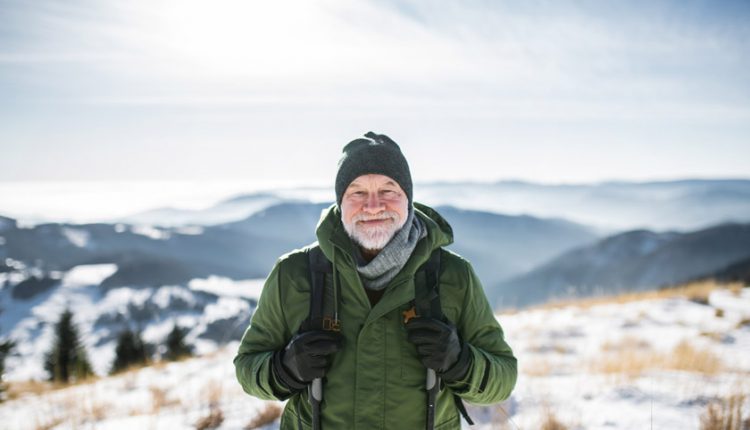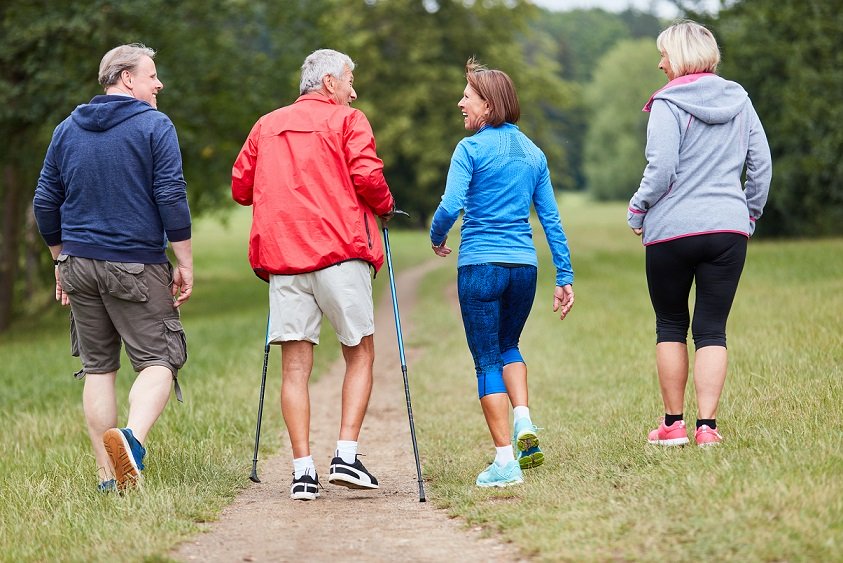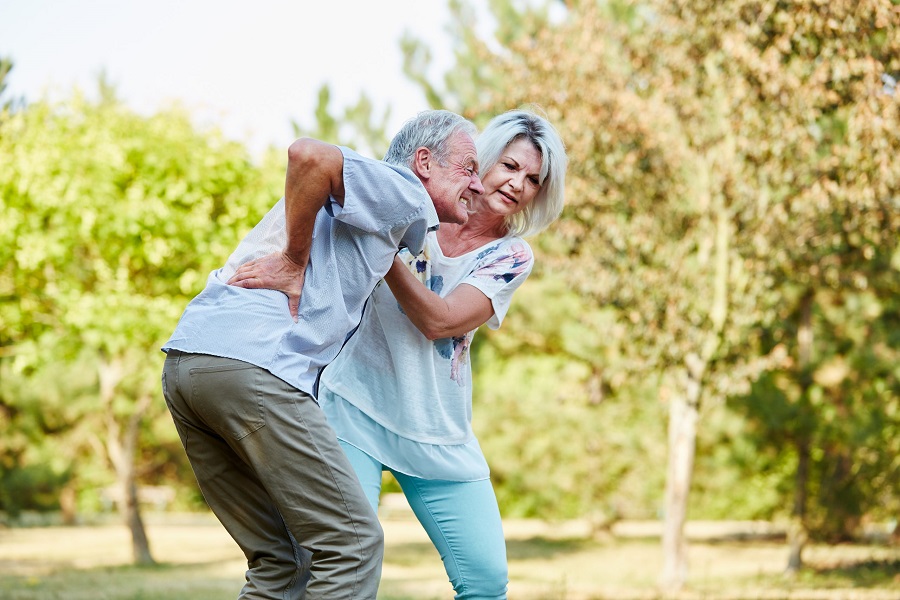
In recent years, we see many seniors who, despite suffering from cardiovascular disease, diabetes, osteoarthritis, obesity, osteoporosis, and low back pain, cannot resist going to the mountains’ heights. Although mountain climbing is a demanding and challenging activity, it can be considered one of the best outdoor exercises for the elderly. In today’s article, we will introduce some of the benefits of mountain climbing for the elderly. After reading this article, we are sure that you will plan for your next weekend to go to one of the mountains in your neighbourhood and enjoy an exercise session amid nature.
If you think that mountaineering may be a little difficult for your age and health, you will be happy to know that mountaineering is just hiking in the heart of nature. If you can walk, you can do gentle climbing.
Gentle mountaineering on steep hills is a sport at your own pace. It has many benefits for the elderly and those who need various endurance, strength, stretching, and balance exercises. Mountaineering encompasses all four of these exercises because it improves heart health, reduces muscle wasting, flexes your body, and increases your balance against falling.
Do you think mountaineering is challenging for your age, or have you never tried this sport before? Take advantage of the benefits of climbing at an older age now. It is never too late to start a sport, and aging should not prevent achieving your goals.
Below are some of the advantages of mountain climbing for the elderly.

Contents
Mountain Climbing Benefits for the Elderly
As said earlier, elderly mountain climbing is hiking in the heart of nature done on a gentle slope. Mountain climbing is not an individual sport and should be done with friends or family members. If this activity is done in groups, it will increase vitality and improve the mood of the elderly. But the physical benefits of mountain climbing for the elderly are seen in the areas of endurance, strength, and balance. Mountain climbing can be a challenging physical activity but offers numerous benefits for the elderly. Mountain climbing can improve cardiovascular health by strengthening the heart and lungs, increasing blood circulation, and lowering blood pressure. This can reduce the risk of heart disease, stroke, and other cardiovascular problems. If you want to experience health and vitality in old age, be sure to participate in mountaineering programs.
Strengthening the Cardiovascular System
For most of the elderly, old age is an inactive period in which they spend most of their time staying at home without having physical activity. A sedentary lifestyle increases the risk of cardiovascular disease in seniors. But the good news is that mountain climbing can help prevent cardiovascular diseases. Going up and down the hills pumps more blood and receives extra oxygen, and it is also suitable for both health. A gentle mountain climbing program involves climbing a distance of more than 2 km and less than 10 km. Through mountain climbing, the muscles and brain receive more blood. Challenging the heart to send more blood to organs can reduce the risk of cardiovascular diseases, such as high blood pressure and bad cholesterol.
Some of the elderly might have concerns about their health during mountain climbing due to previous surgery. According to research, even people who have undergone coronary artery surgery can participate in gentle walking and mountaineering after recovery. For these people, mountain climbing can also boost a person’s mood and self-confidence.
Reducing the Pain of Osteoarthritis
Osteoarthritis is a common disease in people over the age of 60 that is exacerbated by cartilage erosion. Hiking and mountaineering in old age is the easiest way to enhance the health of cartilages and joints. Most of the elderly believe that the pain caused by osteoarthritis means that they should stop doing exercises forever. Contrary to popular belief, gentle climbing can reduce arthritic and knee pains over time. The pain resulting from the muscles’ stiffness during the first days of mountain climbing is natural, and it can decrease as you make mountain climbing a part of your routine program.

Another benefit of mountain climbing as an outdoor exercise for the elderly is seeing the beautiful landscapes of nature that affect the human mind and psyche. The elderly might not have the patience to do indoor activities. Still, mountain climbing enables them to spend their time in the beautiful sceneries of nature while improving their physical and mental strength. The elderly suffering from knee pain and osteoarthritis can hit two birds with one stone if they start mountain climbing since they can reduce their pain and enjoy the beautiful nature.
Benefits of Mountain Climbing for the Elderly with Osteoporosis
Statistics show an increase in osteoporosis in older women. Calcium deficiency and inactivity are the leading causes of osteoporosis in both men and women. It reduces bone density and depletes bone tissue. In this case, the person is prone to bone fractures, and with the slightest impact or movement, the probability of fracture increases.
One of the benefits of mountain climbing for the elderly is the prevention of osteoporosis in old age. During mountain climbing, the bones bear the body’s weight, which helps maintain bone density. Increased blood supply to tissues, organs, and bones in general, keeps bone tissue healthy and dense. It is easily possible to perform fast movements while climbing and regular stretching and jumping in the mountains.
It is recommended to walk on mountain trails to enjoy the benefits of mountaineering during old age. Strengthening bone density and strengthening bone tissue are done without damaging the limbs. In this case, muddy roads are preferable to concrete and asphalt roads. Mountaineering creates a feeling of freedom and health in a person, and the more natural the mountain environment, the calmer the soul.
Mountain Climbing and Fat Loss

Lack of activity during old age can increase body fat, making the elderly overweight. During exercise, especially mountain climbing, the calories needed by the body become three-fold. The body burns and consumes stored fat to provide the calories it needs. On the other hand, a person sweats profusely during exercise, and some of the fat under the skin is washed and excreted by sweating.
Better Capillary Functioning
Under normal conditions and at rest, the body’s capillaries are open and active at 15% of their capacity, but the veins become 95% functional during mountaineering. Since the oxygen and food required by the body reach different parts of the body through the capillaries, nutrients and oxygen reach the brain, muscles, and internal organs of the body more quickly and efficiently.
Recommendations for the Elderly while Mountain Climbing
Take a walk in the mountains at every opportunity. Adventure in the heart of nature is a lovely challenge for people who love life. The mountain environment heals the body and soul. Many older women think that mountaineering is a male sport and are reluctant to participate in mountaineering programs. It is a big mistake. Mountain climbing is a sport suitable for people of all ages.
Another critical point is to choose a simple and low slope route to start climbing. It is recommended that seniors do not participate in challenging mountaineering programs all at once. In previous years, people who have acquired skills in this field could climb higher altitudes with the mountaineering team. Ideal for beginners to gentle mountain climbing.
To enjoy the benefits of mountaineering for the elderly, start with short routes of 2 to 4 km. Remember to carry the equipment you might need during your mountain climbing session. Some of the equipment is as follows:
- Mountain climbing shoes
- Backpack
- Gloves
- Water
- Snack
Carry the necessary items in a backpack. Water and a light snack are required. The danger of dehydration in the mountain awaits the elderly. Bitter chocolate, nuts, and dates are some of the best nutrients in mountaineering.
The bottom line is
The benefits of this enjoyable exercise are endless for the elderly. So, get your things ready and plan for the coming weekend to have a splendid mountain climbing session with your friends or family members.
More Resources:
I have osteoarthritis, and I have tried mountain climbing; I had the right shoes and suitable clothing, and My backpack was not heavy at all. Mount climbing doesn’t work for people with osteoarthritis. All you get is difficulty climbing and worst of all you can not walk for at least three days.
Dear Terry, the best approach is consulting your doctor prior to doing any sport or exercise. Besides, as said in the article, people with osteoarthritis should start with short and low-slope routes.
I’m 60, and I go mountain climbing with my brothers every weekend. Or at least we used to do so before this COVID situation. It is such a joyful activity, and we all love it. I think once you start mountain climbing you will get addicted to how good it makes you feel.
Before I injured my left knee so severely that my doctor forbade mountain climbing for me, It was such a refreshing hobby. Please be aware of slippery little rocks on the way up.
My 85-year-old cousin enjoys hiking around the countryside and along Alpine trails. She’s up, up, and away every holiday break. Age is a state of mind, not a number. There is NO LIMIT to your age, just to your physical health. If you feel physically fit and can handle long uphill hikes, you should give it a shot.
I agree with you, Maria; I am 67, and I guess I am still a kid. I did many years of rock climbing with my son, and now I am just hiking and backpack. I come across more and more men and women on the trail in their 60s. After reading the benefits of mountain climbing, I want to make every day of my 60s mean something and stay healthy. Age is no barrier.
I used to go mountain climbing when I was young. Back then, I felt alive. But now, due to sciatica, I can barely move, let alone climb. I can not help thinking of it. Can anybody help me with this problem?
I’m sorry to hear that, Owen. I’m not saying this method will definitely help you get back to climbing, but you need to push yourself a bit when it comes to sciatica. Even if it’s difficult, try to carry on with your life routine and move as much as possible, even if it hurts. Don’t worry, for it’s not harmful. It can help you get better faster. Do not lie down or sit in one place for long periods. Your doctor can also help you by giving you several exercises that you need to do regularly, plus painkillers. Massage therapy and physiotherapy might be a good option as well, but you should ask your doctor about it. I hope you get well soon 🙂
My dad got me into Mountain Climbing when I was a boy. Nothing serious, mostly just long hikes past where the air thins out, but I cherished those trips.
For me, Mountain Climbing is a great mixture of things. Excellent exercise, a real challenge, magnificent views, seeing geography and personal, photography and almost always great company.
Against that, you require to set discomfort, risk and expense, but that’s a small price to pay.
What I love about mountain climbing is that the people you meet on the mountain are friends.
Its crystal clear that mountain climbing is mentally and physically beneficial, not only for seniors, for every person. But I think there should be some limitations and specific instructions for older people. From my point of view, mountain climbing for seniors should be different from other people. First of all, older adults must consult their dr before choosing mountain climbing as their sport cause it would be so heavy and even harmful for People with asthma or other related health conditions to climb very tall mountains.
It all depends on how bad you want something, doesn’t it?
No matter what age you start, there are delightful things you can do in the mountains….
One of the great aspects of Mountaineering is that there are mountains that are very easy and require simple skills like hiking, knowing what to bring and what to look out for in the weather.
And the fitter you are and the more skills you learn, the more different aspects of Mountaineering you can enjoy.
I suggest great books like “The Freedom of the Hills” to learn about Mountaineering.